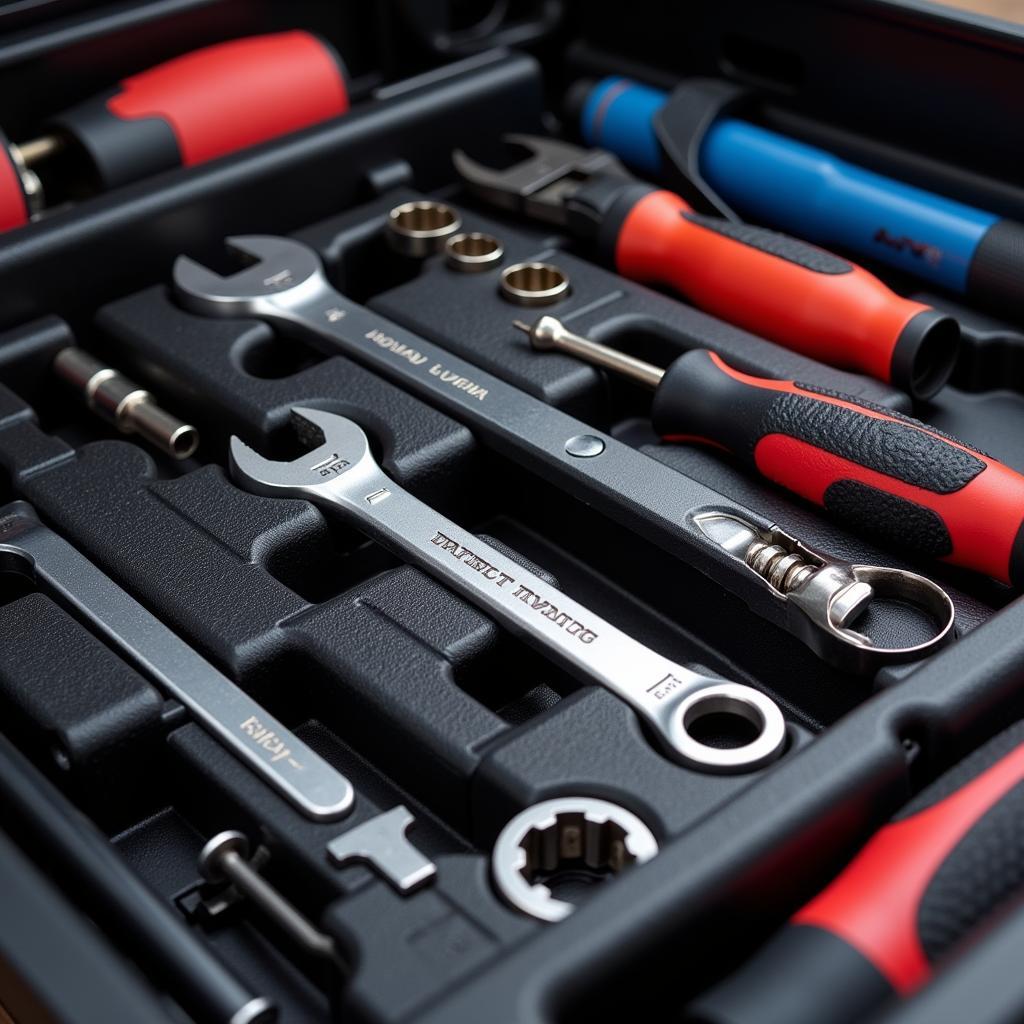Car tools. These seemingly simple instruments are the backbone of automotive maintenance, repair, and diagnostics. Whether you’re a seasoned mechanic or a DIY enthusiast, understanding the different types of car tools available is crucial for effectively tackling any automotive task. From simple hand tools to complex diagnostic equipment, this comprehensive guide will delve into the essential types of car tools, their functions, and how they empower you to keep your vehicle running smoothly. identify types of care and support planning tools available This knowledge will not only equip you to choose the right tools for the job but also empower you to make informed decisions about your car’s maintenance.
Hand Tools: The Foundation of Every Toolbox
Hand tools are the fundamental building blocks of any car tool collection. These tools are indispensable for various tasks, ranging from simple oil changes to more complex repairs.
- Wrenches: Essential for tightening and loosening nuts and bolts, wrenches come in various types like combination wrenches, open-end wrenches, and adjustable wrenches.
- Screwdrivers: Used for driving screws in and out, screwdrivers are available in various sizes and head types, including Phillips, flathead, and Torx.
- Pliers: Versatile tools for gripping, cutting, and bending wires, pliers are essential for electrical work and other intricate tasks.
- Sockets and Ratchets: These tools provide leverage and speed for removing and installing nuts and bolts, particularly in tight spaces.
- Hammers: Useful for driving in nails, removing stuck parts, and other tasks requiring impact force.
 Essential Hand Tools for Automotive Repair
Essential Hand Tools for Automotive Repair
Diagnostic Tools: Unveiling Your Car’s Secrets
Diagnostic tools are the eyes and ears of the modern mechanic. These tools provide valuable insights into the inner workings of your vehicle, helping you pinpoint issues quickly and accurately.
- OBD-II Scanners: These devices connect to your car’s onboard computer and retrieve diagnostic trouble codes (DTCs), providing clues about potential problems.
- Multimeters: Essential for testing electrical circuits and components, multimeters measure voltage, current, and resistance.
- Pressure Gauges: Used to measure various pressures, such as tire pressure, fuel pressure, and oil pressure, these gauges help ensure optimal performance and safety.
- Vacuum Gauges: These tools measure engine vacuum and can help diagnose issues related to intake leaks, valve timing, and other engine problems.
Power Tools: Amplifying Your Efficiency
Power tools bring speed and efficiency to demanding automotive tasks, making complex jobs easier to manage.
- Impact Wrenches: These powerful tools quickly remove and install lug nuts and other fasteners, saving time and effort.
- Drills: Versatile tools for drilling holes, driving screws, and other tasks requiring rotational force.
- Grinders: Used for removing rust, shaping metal, and other tasks requiring abrasive action.
- Sanders: Essential for smoothing surfaces and preparing them for painting or other finishing work.
Specialized Car Tools: Addressing Unique Needs
types of assessment tools in infant toddler care Beyond the general-purpose tools, specialized car tools cater to specific tasks and vehicle systems.
- Brake Bleeders: These tools help remove air from brake lines, ensuring optimal braking performance.
- Fuel Injection Testers: Used to diagnose fuel injector problems, these tools can help identify clogged or malfunctioning injectors.
- Compression Testers: These tools measure cylinder compression, providing valuable insights into engine health and performance.
What are the different types of car tools used for electrical work?
Electrical work on cars requires specialized tools to ensure safety and accuracy. These include multimeters, wire strippers, crimpers, and circuit testers.
Which car tools are essential for changing a tire?
Changing a tire requires a jack, lug wrench, and spare tire. A wheel chock is also recommended for added safety.
different types of quality measurement tools in health care
Conclusion
Understanding the various types of car tools is fundamental for anyone working on vehicles. Whether you’re a professional mechanic or a DIY enthusiast, having the right tools for the job empowers you to maintain, repair, and diagnose car problems effectively. By investing in quality car tools and learning how to use them properly, you can keep your vehicle in top condition and ensure its longevity.
“Having the right tools is half the battle,” says renowned automotive expert, Michael Stevenson. “Knowing how to use them effectively is the other half.”
FAQ
- What are the most common types of car tools?
- What are the benefits of using specialized car tools?
- How do I choose the right car tools for a specific task?
- Where can I buy quality car tools?
- How do I maintain my car tools to ensure their longevity?
Need help with your car diagnostics or looking for advice on the right tools for the job? Contact us via WhatsApp: +1(641)206-8880, Email: [email protected] or visit our workshop at 910 Cedar Lane, Chicago, IL 60605, USA. Our 24/7 customer service team is always ready to assist you.